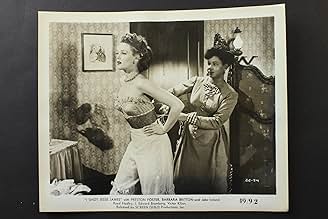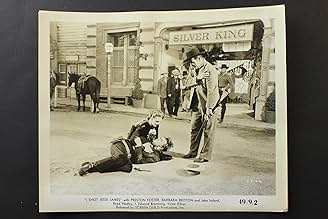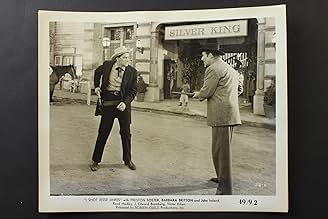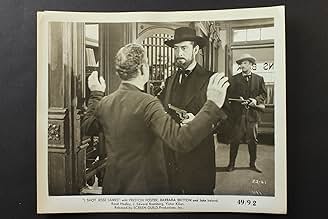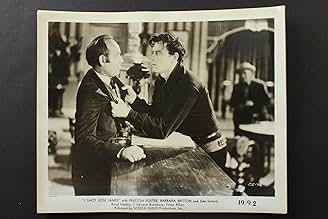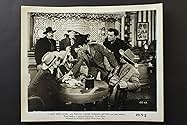AVALIAÇÃO DA IMDb
6,8/10
2,7 mil
SUA AVALIAÇÃO
Bob Ford mata seu melhor amigo Jesse James para obter perdão que pode libertá-lo para se casar com sua namorada, mas ele é atormentado por culpa e nojo.Bob Ford mata seu melhor amigo Jesse James para obter perdão que pode libertá-lo para se casar com sua namorada, mas ele é atormentado por culpa e nojo.Bob Ford mata seu melhor amigo Jesse James para obter perdão que pode libertá-lo para se casar com sua namorada, mas ele é atormentado por culpa e nojo.
- Direção
- Roteiristas
- Artistas
Tommy Noonan
- Charles Ford
- (as Tom Noonan)
Barbara Wooddell
- Mrs. Zee James
- (as Barbara Woodell)
Phillip Pine
- Man in Saloon
- (as Phil Pine)
Victor Adamson
- Townsman
- (não creditado)
Fred Aldrich
- Townsman
- (não creditado)
Phil Bloom
- Townsman
- (não creditado)
- Direção
- Roteiristas
- Elenco e equipe completos
- Produção, bilheteria e muito mais no IMDbPro
Avaliações em destaque
It's one of the oldest Western stories: Jesse James was a big-time outlaw, robbing banks left and right, alongside his gang, including Robert Ford. One day, upon hearing of the huge bounty (and possibility of amnesty for anyone in the gang) for Jesse's murder, Ford took it upon himself to kill him so that he could be free and clear to mary his would-be wife. But things didn't quite turn out right afterwords, and Ford was considered more-so a coward, a traitor for doing this act, and any gunslinger who could gun Ford down would then be seen as the baddest dude in the west. At least, that's the legend anyway that comes out of the main plot. But there's more to it, at least under the surface, that Samuel Fuller gets to in his take on the legend of one man's existential downfall from killing his best friend, who happened to be the most feared- and yet most admired- bank robber in America for a short while. Fuller might be asking why he was admired, when he didn't do anything that really merited praise only in hindsight. There's a sense of pure melodrama, brimming with acting that is typical for the budget, but somehow Fuller brings out the best in what might be a little limited in the character actors.
John Ireland says a lot in the understated expressions on his face, the tense feeling of rejection from the only one he can get close to- once Jesse is out of the picture- and likewise Cynthy (Barbara Britton) is very good at doing the 'acting-concerned' woman that is reluctant to be on Ford's sleeve. It's all the more compelling because Fuller could easily make the direction more into a black and white category, that Ford is bad like Jesse was, and Cynthy is more than in her reasoning for not wanting to marry him. But even in the pulpy world of Jesse James and Robert Ford, there is room for compromise. I liked seeing the scenes where Ford goes through the humiliating act of doing a theater re-enactment of the killing scene, but suddenly seeing in a vision the actual act he performed superimposed over the pantomime. And, immediately after, as one of the very best scenes in the film, a traveling singer who sings a song terrified in Ford's face about how much of a traitor he was for killing such a man like Jesse James.
It's a sharp script considering what Fuller would have to work with, but it's also the simplicity of his craft (it might be one of those genre films where the style is so stripped down to bare essentials with necessary close-ups, consistent medium shots, that when something 'stylistic' happens like in the last shootout between Kelly and Ford that it is shocking), how Fuller pushes it into looking like a tale that on the surface as a conventional feature. But watch how the suddenness of violence sparks up interest in the craft, how the opening bank robbery is timed and shot with the same level- or even more- tension than your average heist thriller. Or in the actual infamous scene itself, which is preceded by Ford getting a chance beforehand when James was in the bath, and the cut-aways to the POV at the back. It's bold-faced type through a crisp full-frame lens.
And while Fuller would still go on to make greater films, I Shot Jesse James is a fantastic prototype for a great career, where history merges with the human process of change, and how love, however a typical thing in a triangle situation, complicates even the strongest of men.
John Ireland says a lot in the understated expressions on his face, the tense feeling of rejection from the only one he can get close to- once Jesse is out of the picture- and likewise Cynthy (Barbara Britton) is very good at doing the 'acting-concerned' woman that is reluctant to be on Ford's sleeve. It's all the more compelling because Fuller could easily make the direction more into a black and white category, that Ford is bad like Jesse was, and Cynthy is more than in her reasoning for not wanting to marry him. But even in the pulpy world of Jesse James and Robert Ford, there is room for compromise. I liked seeing the scenes where Ford goes through the humiliating act of doing a theater re-enactment of the killing scene, but suddenly seeing in a vision the actual act he performed superimposed over the pantomime. And, immediately after, as one of the very best scenes in the film, a traveling singer who sings a song terrified in Ford's face about how much of a traitor he was for killing such a man like Jesse James.
It's a sharp script considering what Fuller would have to work with, but it's also the simplicity of his craft (it might be one of those genre films where the style is so stripped down to bare essentials with necessary close-ups, consistent medium shots, that when something 'stylistic' happens like in the last shootout between Kelly and Ford that it is shocking), how Fuller pushes it into looking like a tale that on the surface as a conventional feature. But watch how the suddenness of violence sparks up interest in the craft, how the opening bank robbery is timed and shot with the same level- or even more- tension than your average heist thriller. Or in the actual infamous scene itself, which is preceded by Ford getting a chance beforehand when James was in the bath, and the cut-aways to the POV at the back. It's bold-faced type through a crisp full-frame lens.
And while Fuller would still go on to make greater films, I Shot Jesse James is a fantastic prototype for a great career, where history merges with the human process of change, and how love, however a typical thing in a triangle situation, complicates even the strongest of men.
After seeing The Assassination Of Jesse James By The Coward Robert Ford, one realizes just how dated this film is as compared to the one that Casey Affleck won an Academy Award nomination for. That more recent film is far closer to the truth. It certainly has the right age for Robert Ford in real life was barely out of his teens, not an adult as John Ireland was in this film, nor a host of others who've played Ford in various Jesse James movies.
Still this western made by Samuel Fuller, his first as a director, does have a landmark status of sorts with a fine performance by John Ireland in the title role. According to this version he did this one for love and that huge amnesty money promised by the Governor of Missouri which he never got, that part is true. It was love of Barbara Britton who plays the object of Ireland's affections.
The real Robert Ford and John Ireland in this film must have thought he'd be a hero. His celebrity such as it was was akin to what O.J. Simpson got after his acquittal. People who kill for a bounty were regarded then as now as a necessary evil, but not folks you invite to your dinner table.
Samuel Fuller got good performances out of Ireland, Britton and the rest of a fine cast. It's not a bad Jesse James film, a man who has never ceased to fascinate Hollywood.
Still this western made by Samuel Fuller, his first as a director, does have a landmark status of sorts with a fine performance by John Ireland in the title role. According to this version he did this one for love and that huge amnesty money promised by the Governor of Missouri which he never got, that part is true. It was love of Barbara Britton who plays the object of Ireland's affections.
The real Robert Ford and John Ireland in this film must have thought he'd be a hero. His celebrity such as it was was akin to what O.J. Simpson got after his acquittal. People who kill for a bounty were regarded then as now as a necessary evil, but not folks you invite to your dinner table.
Samuel Fuller got good performances out of Ireland, Britton and the rest of a fine cast. It's not a bad Jesse James film, a man who has never ceased to fascinate Hollywood.
a good work, interesting western, smart story. in fact, more than adaptation of an American modern history episode, it seems be adaptation of Ahasverus myth. because it is portrait of a sin committed with noble intention. and that fact is basic virtue of that drama. it does a simple movie, mixture of love and revenge, who can impress first for its deep roots. it is a a film remarkable for actors performance because the acting is , in this case,precise tool not for present a story but to discover the profound human side of characters. and that fact has a correct result and the force of seduction for large public. it is a good work. and that thing is a real admirable virtue for the manner to expose the story in inspired light. and , for that fact, the merit of John Ireland is not little.
Sam Fuller's first film direction is a version of what happened to Robert Ford (John Ireland), the man who famously killed his friend - Jesse James (Reed Hadley).
Taking up the basic elements of the real life story, Fuller keeps the narrative tight whilst ensuring the complexities of the main characters come to the fore. All the quirks and peccadilloes of the human condition are explored (the detail of Ford's torments and troubles superbly told), which is something of a rarity for a late 1940s "B" standard Western. The use of close-ups are to purposely highlight the psychological discord on show, marking this out as a good pointer to the later work of its maverick director. Ernest Hiller photographs the exteriors out of Iverson Ranch in Chatsworth and support to Ireland comes from Preston Foster, Barbara Britton and J. Edward Bromberg. 7/10
Taking up the basic elements of the real life story, Fuller keeps the narrative tight whilst ensuring the complexities of the main characters come to the fore. All the quirks and peccadilloes of the human condition are explored (the detail of Ford's torments and troubles superbly told), which is something of a rarity for a late 1940s "B" standard Western. The use of close-ups are to purposely highlight the psychological discord on show, marking this out as a good pointer to the later work of its maverick director. Ernest Hiller photographs the exteriors out of Iverson Ranch in Chatsworth and support to Ireland comes from Preston Foster, Barbara Britton and J. Edward Bromberg. 7/10
it reminds the Biblical stories. or damned characters of Dostoievski.in fact, it is an inspired western, proposing a hero, a coward mate and the fall of dreams, a show as remind of guilt and the public contempt. a film who did not demonstrate anything. only gives a large picture about gestures and fragile and obscure border between bad and good. and this transforms "I Shot Jesse James" more than a B western but a demonstration about values and expectations and illusion and friendship. the noble Jesse James and the knavish Ford. a story with moral veil who remains nice demonstration about limits and falls.
Você sabia?
- CuriosidadesDirector Samuel Fuller said that he wanted to make this picture because, unlike many filmmakers in Hollywood, he did not see the real Jesse James as a folk hero or someone to be admired. Fuller saw him as a cold-blooded psychopath who shot down women, children, the elderly, the helpless (his gang once stopped a Union hospital train and executed every wounded federal soldier on it) and, in Fuller's words, Bob Ford "did something that should have been done quite a bit earlier in the life of Jesse Woodson James".
- Erros de gravaçãoWhen Jesse's wife serves bread at dinner, the bread presented has obviously been sliced by a modern bread-slicing machine. Bread-slicing machines were not introduced until 1928.
- Citações
Bob Ford: Whatta yuh got to eat?
Joe, Silver King Bartender: Sweet corn, cornmeal mush, cornpone with cracklins, and corn whiskey.
Bob Ford: I'll have it.
- Cenas durante ou pós-créditosOpening credits are shown as posters hanging on a wall.
- ConexõesFeatured in Gunfighters of the Old West (1992)
Principais escolhas
Faça login para avaliar e ver a lista de recomendações personalizadas
- How long is I Shot Jesse James?Fornecido pela Alexa
Detalhes
- Data de lançamento
- País de origem
- Idioma
- Também conhecido como
- Matei Jesse James
- Locações de filme
- Empresa de produção
- Consulte mais créditos da empresa na IMDbPro
- Tempo de duração
- 1 h 21 min(81 min)
- Cor
- Proporção
- 1.37 : 1
Contribua para esta página
Sugerir uma alteração ou adicionar conteúdo ausente

